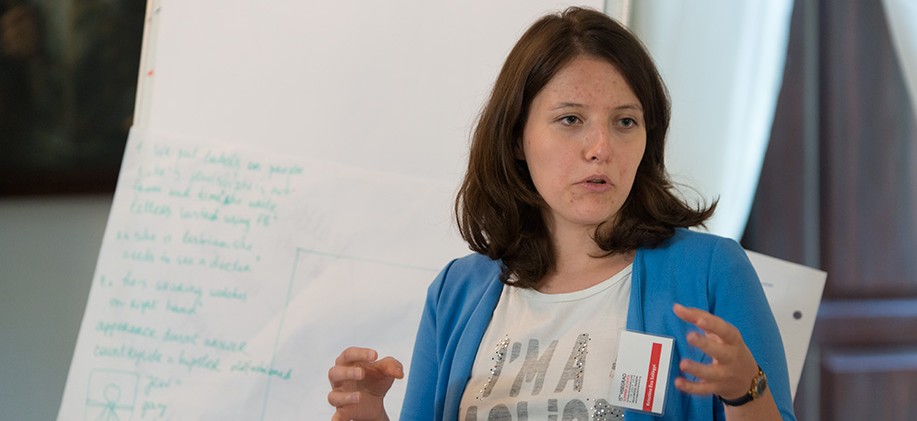
Start with “Why“!
The last session providing the chance to flesh out the projects within the Lab. Joanna Orlik – director oft the Małopolski Institute of Culture, guest tutor of the Culture Lab – introduced a very precise scheme to the participants according to which they should work on their cultural projects. What this “magical scheme“ demanded was to answer the questions “Why?“, “What?“ and “How?“. The “Why“ refers to the motivation, precisely to the value the project is based on. The “What“ shall reveal the idea (the objective of the project, the change one wants to achieve). And, finally, answering the question “How?“ means to present the actual project, the concrete things one intends to do.
Now, the four groups set together and had some time to think about how to adapt the required three items to their projects. The next step was to practice project presentations according to the given scheme – presentations respectively given by a chosen speaker of the group which should be very brief and as convincing as possible. After each project presentation, the audience pronounced opinions, discussed what was convincing and what was not convincing. Joanna Orlik highlighted amongst others that it is important to stick to the order of the scheme (“Start with 'Why'!“) and to be mindful of a good start and a good end of the presentation.
Fundraising essentials
Upon former request of the participants, Joanna Orlik presented an overview about fundraising essentials pointing to useful links on the internet. Here are some of the important hints given: “Fundraising is NOT asking for money. It's story telling. … Make the donor a hero. … You should illustrate that the donor can contribute to make a difference – presenting the difference is important. … Create interest, build relations. … Avoid the implication that your audience 'should' do something.
Peasant Business School – A case study
As the last highlight of the Culture Lab, the participants had the special opportunity to get to know a real cultural project: The interactive game “Chłopska Szkoła Biznesu“ (“Peasant Business School“) which was created in a cooperation between the Muzeum Historyczno-Etnograficzne in the Polish small town Andrychów and the Małopolski Institute of Culture (MIK) in Krakow. Anna Sarlej, a staff member of the MIK, presented this game to the audience. The idea of the game was to make aware of a long forgotten but very interesting chapter of Andrychów's history: The prospering trade of craftsmen in Andrychów in the late 18th century who took great advantage of business cooperations, of strength in unity. It was astonishing to hear that a project which started with something so small – with handwritten papers and beans as makeshift supplies – awarded so many prizes later on, gained so many project partners, turnament players. The list of numbers which account for the success is long. This was very inspiring, a prove that you can come up with a really good project even with the poorest material basis. The basis which matters foremost consists of creativity and synergy! Anna Sarlej explained them the rules – and they became trading craftsmen (weavers, bakers or blacksmiths). Pairs of craftsmen being united in buziness cooperations competed against each other, trying to earn the most money within a restricted time. Producing products, buying, selling, negotiating with the trade partner and with other traders, bargaining, venturing mercantile expeditions to Polish or farther European cities, even slight tries to initiate black marketing. The participants had convinced themselves of the quality of the Peasant Business School, and the grounding of its success became explicit to them. The experience of this case study of a cultural project was a perfect finish for the very intersting, inspiring and enjoyable Culture Lab. The last completion will be achieved on Friday with the presentation of the four cultural projects.
by Jill-Francis Käthliz













